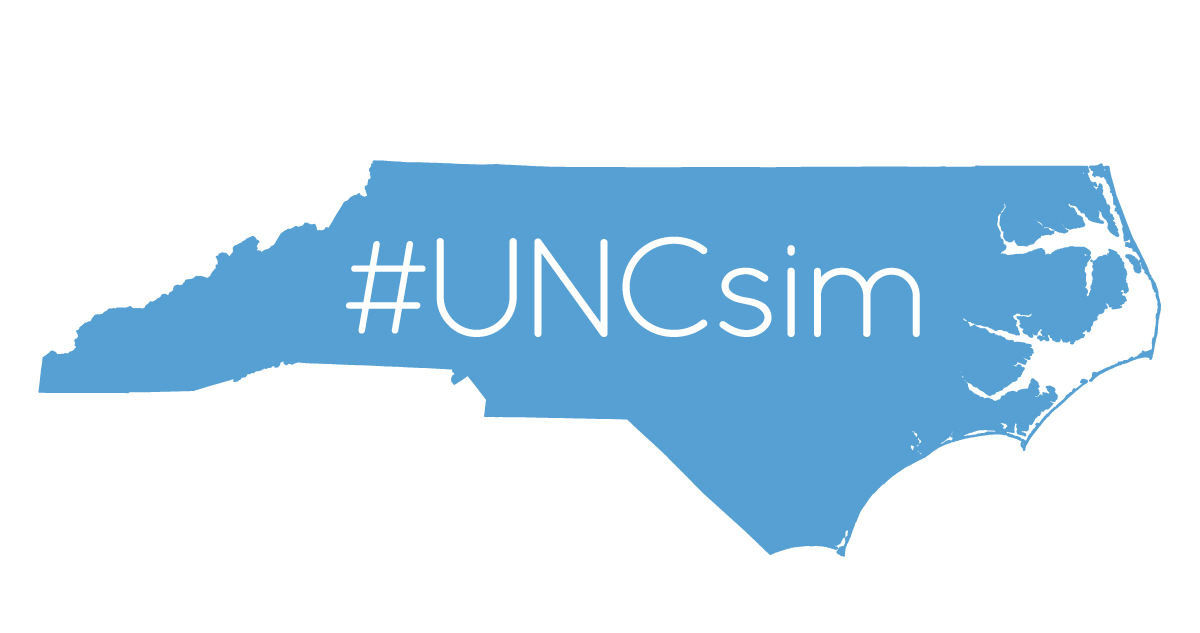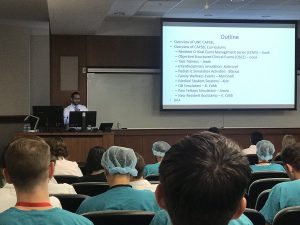 Earlier today, the Consortium of Anesthesiology Patient Safety and Experiential Learning (CAPSEL) team presented Grand Rounds for the Anesthesia Department.
Earlier today, the Consortium of Anesthesiology Patient Safety and Experiential Learning (CAPSEL) team presented Grand Rounds for the Anesthesia Department.
The presentation began with Dr Rob Isaak, CAPSEL Director, providing an overview of the goals and composition of the team. He then gave an overview of the weekly resident education simulation sessions held in the Clinical Skills and Patient Simulation Center. Anesthesia has “45 sessions for resident education per year”. The award winning objective structured clinical examination (OSCE) program is a separate assessment session to assess milestones and prepare residents for the new American Board of Anesthesiology clinical board certification examination process beginning this year.
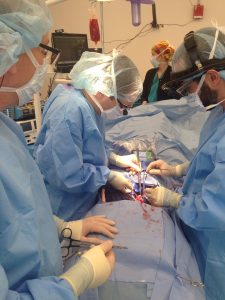 Dr Kolarczyk followed by discussing the interprofessional education (IPE) learning opportunities being performed by the team. These include resident training events where anesthesia and surgery residents perform simulation cases together in a simulation lab as well as full operating room (OR) team simulations where teams practice management of critical events in-situ.
Dr Kolarczyk followed by discussing the interprofessional education (IPE) learning opportunities being performed by the team. These include resident training events where anesthesia and surgery residents perform simulation cases together in a simulation lab as well as full operating room (OR) team simulations where teams practice management of critical events in-situ.
Following the overview of adult anesthesia IPE activities, Dr Baboolal provided insight into the in-situ IPE simulations as well as the pediatric anesthesia resident and fellowship OSCE simulations. Many of these educational and quality improvement (QI) activities include collaborations within the state (Duke), around the country (Johns Hopkins and the Children’s Hospital of Philadelphia) as well as Internationally (Malawi). Dr. Kimberly Blasius was recently recognized with the Excellence in Scholarship Award by the UNC Academy of Educators (AOE) for her leadership in these programs.
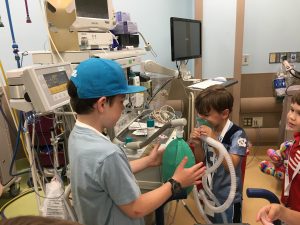 With burnout remaining a major concern in anesthesia and healthcare in general, Dr Martinelli presented on the simulation based initiatives to improve wellness for the team and their families. The Department Wellness Committee hosted a “Family Day” event to educate the people who support our anesthesia providers at home to the technical challenges and stresses encountered daily by our anesthesia team in order to improve empathy. The event not only educated family members, but “opened their eyes” to the life of an anesthesia provider.
With burnout remaining a major concern in anesthesia and healthcare in general, Dr Martinelli presented on the simulation based initiatives to improve wellness for the team and their families. The Department Wellness Committee hosted a “Family Day” event to educate the people who support our anesthesia providers at home to the technical challenges and stresses encountered daily by our anesthesia team in order to improve empathy. The event not only educated family members, but “opened their eyes” to the life of an anesthesia provider.
Dr Kyle then showed how simulation education is being applied to medical student education by the department. Throughout their rotation, medical students perform many procedures like epidural catheter placement and peripheral nerve blocks on task trainers. They also manage inductions on the simulator to apply the knowledge they have gained while in the OR. Students participate in the weekly resident training sessions as well in an effort to expose them to advanced topics and engage many of them into the prospect of a career in anesthesia. The Anesthesia Interest Group continues to provide similar activities throughout the year as well.
Dr Ben Cobb then provided and overview of the simulation program that has grown from the obstetrics QI work and Dr Ivester’s IPE based maternal hemorrhage protocol that was funded by the Institute for Healthcare Quality Improvement (IHQI). These projects have made significant improvements to team response to obstetric emergencies and identified numerous system improvement opportunities.
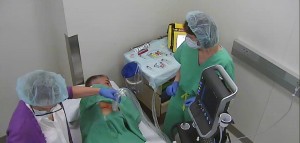 Dr Jowza’s new pain fellowship OSCE sessions were presented next. The fellows experience mixed modality simulations that combined task trainers, mannequin simulator, and standardized patients or staff. These simulations focused on the team’s ability to recognize difficult situations, communicate with patients and staff, and manage a crisis.
Dr Jowza’s new pain fellowship OSCE sessions were presented next. The fellows experience mixed modality simulations that combined task trainers, mannequin simulator, and standardized patients or staff. These simulations focused on the team’s ability to recognize difficult situations, communicate with patients and staff, and manage a crisis.
Dr Kate Cobb provided an overview of orientation simulations the new Clinical Anesthesia 1 (CA1 or PGY2) residents perform prior to patient care. These simulations include task trainers for tasks like nerve blocks as well as treatment of common anesthesia events such as hypoxia.
The mic was the returned to Dr Isaak who thanked the many team members required to run such an incredible program. The audience then had an opportunity to ask questions.
Thank you Dr Isaak and CAPSEL team for such an excellent grand rounds presentation!
